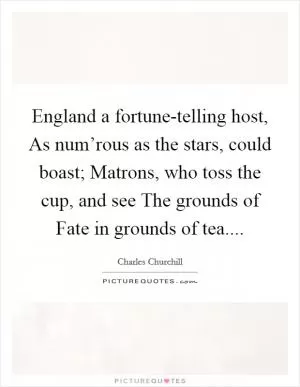Nature listening stood, whilst Shakespeare played and wondered at the work herself had made

Nature listening stood, whilst Shakespeare played and wondered at the work herself had made
Charles Churchill was a renowned English poet and satirist of the 18th century, known for his sharp wit and critical observations of society and politics. His works often delved into the complexities of human nature and the follies of the world around him. In the context of the phrase "Nature listening stood, whilst Shakespeare played and wondered at the work herself had made," one can see how Churchill's own poetic sensibilities and admiration for the natural world may have influenced his writing.Churchill, like many poets of his time, drew inspiration from the beauty and wonder of nature. The phrase "Nature listening stood" suggests a sense of reverence and awe for the natural world, as if even the elements themselves were captivated by the beauty of their own creation. This idea of nature as a silent observer, listening intently to the music of the world around it, reflects Churchill's own appreciation for the harmony and balance of the natural world.
The mention of Shakespeare in the phrase also speaks to Churchill's admiration for the great literary figures who came before him. Shakespeare, often considered the greatest playwright in the English language, was a source of inspiration for Churchill and many other writers of his time. The idea of Shakespeare playing, or creating, within the bounds of nature suggests a deep connection between art and the natural world, as if the two were inextricably linked.
The phrase "wondered at the work herself had made" hints at a sense of self-reflection and introspection on the part of nature. Churchill may have seen nature as a living, breathing entity, capable of creating and shaping the world around it. This idea of nature as a conscious, sentient being aligns with Churchill's own belief in the power and majesty of the natural world.












 Friendship Quotes
Friendship Quotes Love Quotes
Love Quotes Life Quotes
Life Quotes Funny Quotes
Funny Quotes Motivational Quotes
Motivational Quotes Inspirational Quotes
Inspirational Quotes